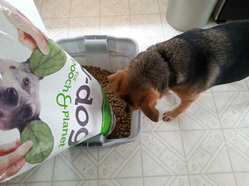
No, I’m not referring to vegan hot dogs. Yes, my dogs are vegan. Or to put it a better way, my dogs are plant-based.
Last weekend as Kona raced around our campsite, running circles around and tiring out one of her younger playmates, a friend walked up and commented as she watched Kona run full speed, lap after lap:
“Now there’s a great testimonial for a vegan diet for dogs!”
Last October I switched both of my dogs over to V-Dog, a plant-based dry dog food. In addition, I continue to add chopped up fresh veggies and brown rice to their meals, and I always share my green smoothie with Sena (Kona hasn’t taken to the green smoothies). I also sometimes slip a little tofu into their meals as well. And they are both thriving!
The main reason I switched my dogs away from animal-based dog food is the same reason that I stopped eating animal-based food myself. Namely that the science shows over and over again in thousands of peer-reviewed publications that plant-based foods promote excellent health and prevent diseases, while animal-based foods promote poor health.
I know from working in the pharmaceutical industry that efficacy in dogs is tested after efficacy in mice or rats is achieved and often indicates likely efficacy in humans, meaning that if an intended result is achieved in mice or rats, and then in dogs, it will also likely be achieved in humans.
Numerous results indicating efficacy of a plant-based diet for promoting excellent health and preventing chronic degenerative diseases in both mice and humans have been published in the peer-reviewed scientific literature. So I hypothesized that dogs should experience similar healthful benefits on a plant-based diet. And while my study population is only two dogs (N=2), I’m happy to report that both of my dogs are full of life and energy for their ages (Sena is 12 and Kona is 5), their coats look like they were just bathed, and so far, two veterinarians have commented on how healthy they both are.
V-Dog derives its protein from peas, lentils, and potato protein, and is loaded with whole plant-based ingredients, including grains (oats, sorghum, quinoa, millet, alfalfa), nuts and seeds (peanuts, sunflower seeds, flax seeds), veggies (carrots, celery, beets, parsley, lettuce, watercress, spinach), and fruit (dried cranberries and blueberries, both powerful antioxidants), along with supplements formulated for pets (V-Dog is available in some pet stores or at www.v-dog.com)..
I couldn’t be happier with my decision to feed my fur-babies exclusively plant-based foods, just as I do for myself, so that I can have them around and healthy for as long as possible!
Last weekend as Kona raced around our campsite, running circles around and tiring out one of her younger playmates, a friend walked up and commented as she watched Kona run full speed, lap after lap:
“Now there’s a great testimonial for a vegan diet for dogs!”
Last October I switched both of my dogs over to V-Dog, a plant-based dry dog food. In addition, I continue to add chopped up fresh veggies and brown rice to their meals, and I always share my green smoothie with Sena (Kona hasn’t taken to the green smoothies). I also sometimes slip a little tofu into their meals as well. And they are both thriving!
The main reason I switched my dogs away from animal-based dog food is the same reason that I stopped eating animal-based food myself. Namely that the science shows over and over again in thousands of peer-reviewed publications that plant-based foods promote excellent health and prevent diseases, while animal-based foods promote poor health.
I know from working in the pharmaceutical industry that efficacy in dogs is tested after efficacy in mice or rats is achieved and often indicates likely efficacy in humans, meaning that if an intended result is achieved in mice or rats, and then in dogs, it will also likely be achieved in humans.
Numerous results indicating efficacy of a plant-based diet for promoting excellent health and preventing chronic degenerative diseases in both mice and humans have been published in the peer-reviewed scientific literature. So I hypothesized that dogs should experience similar healthful benefits on a plant-based diet. And while my study population is only two dogs (N=2), I’m happy to report that both of my dogs are full of life and energy for their ages (Sena is 12 and Kona is 5), their coats look like they were just bathed, and so far, two veterinarians have commented on how healthy they both are.
V-Dog derives its protein from peas, lentils, and potato protein, and is loaded with whole plant-based ingredients, including grains (oats, sorghum, quinoa, millet, alfalfa), nuts and seeds (peanuts, sunflower seeds, flax seeds), veggies (carrots, celery, beets, parsley, lettuce, watercress, spinach), and fruit (dried cranberries and blueberries, both powerful antioxidants), along with supplements formulated for pets (V-Dog is available in some pet stores or at www.v-dog.com)..
I couldn’t be happier with my decision to feed my fur-babies exclusively plant-based foods, just as I do for myself, so that I can have them around and healthy for as long as possible!



 RSS Feed
RSS Feed